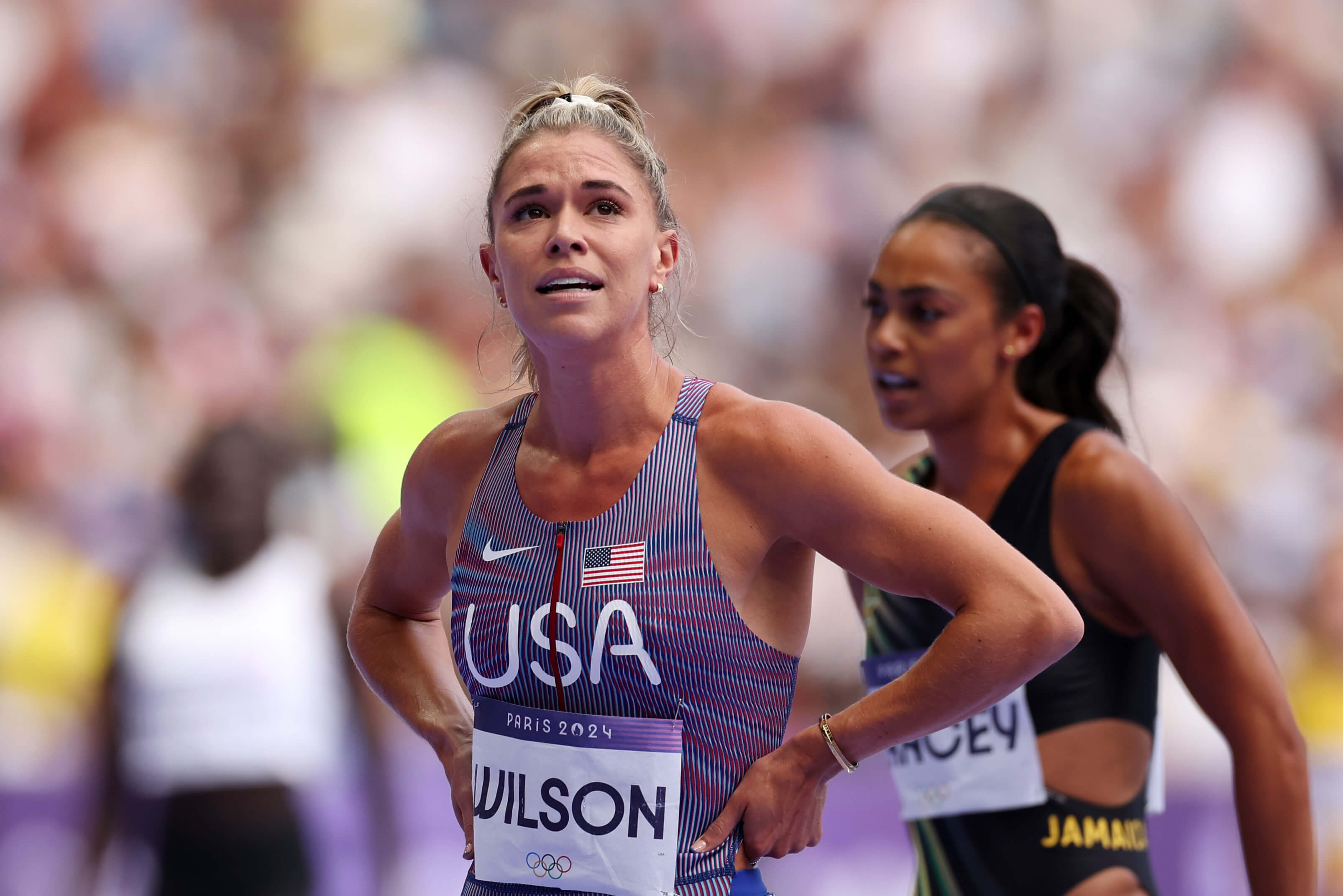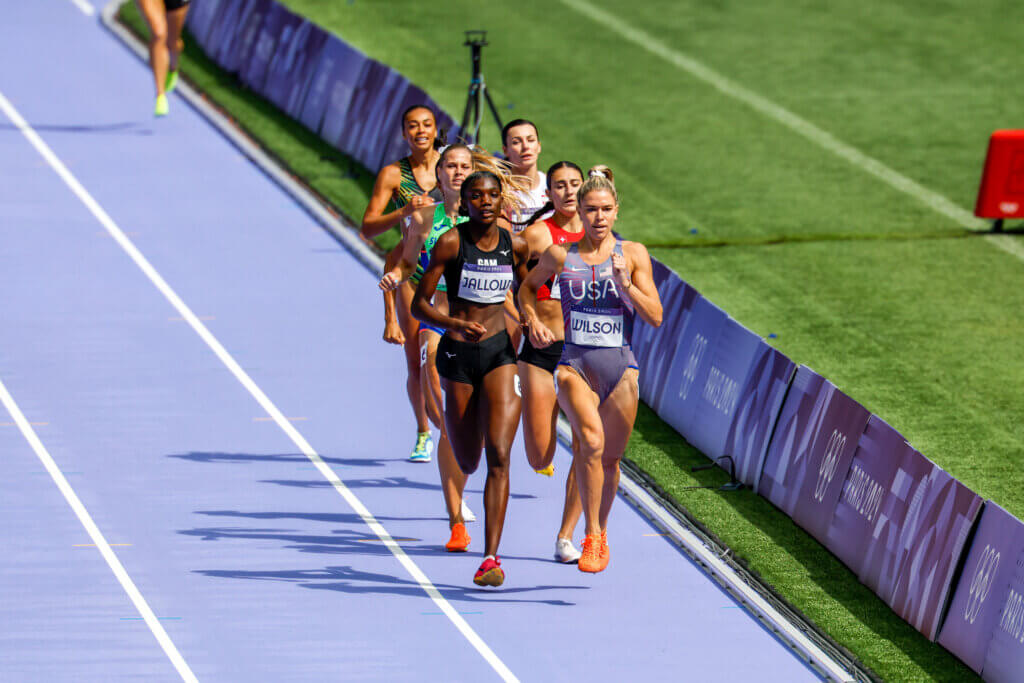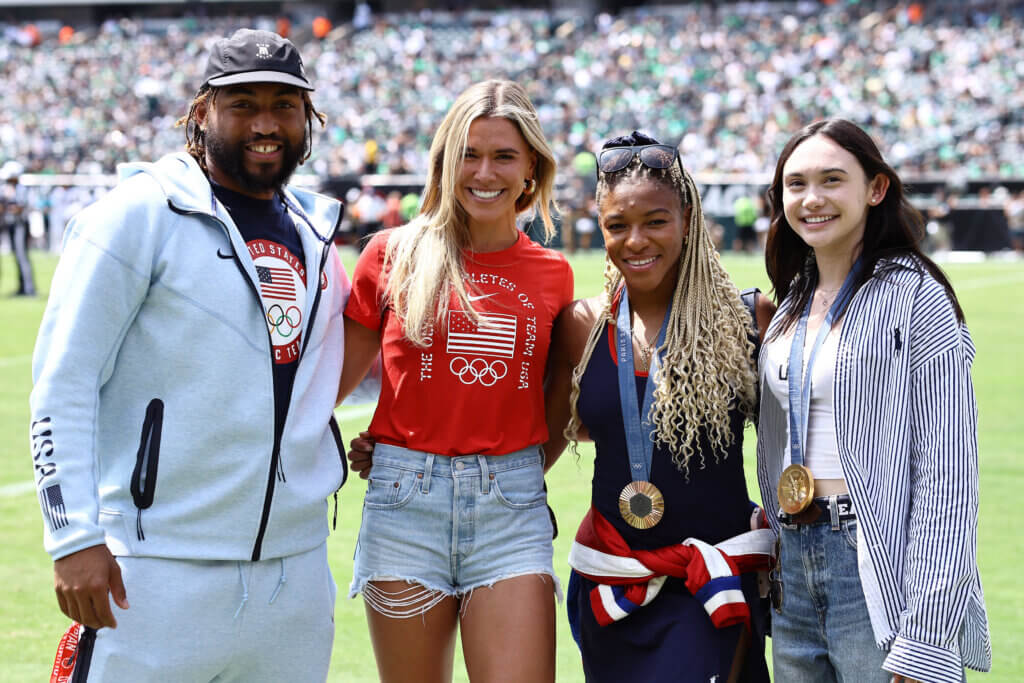
She’ll Always Have Paris
Allie Wilson’s road to the Olympics was anything but smooth, but her story proves that some dreams are worth the struggle.
Allie Wilson ’18, ’19M was about halfway through her time at Monmouth when the wake-up call came. She wasn’t expecting it, and she certainly didn’t enjoy it. But she knows that it was the spark for much of what she’s accomplished since.
The challenge came from her coaches, particularly then-assistant coach Chris Tarello, who made it clear that Wilson’s level of commitment was insufficient. That there were other athletes on the Hawks’ track team who might have lacked Wilson’s talent, but whose dedication dwarfed hers. That maybe it was time to sit down and talk seriously about her future with the program.
“I was showing up to practice every day and working hard, but I was also having a lot of fun, living the college experience,” she says. “I didn’t realize how much the things I was doing outside of practice—going out, not getting enough sleep—would affect my performance. So, he pulled me aside, and obviously it really upset me; at the time, it felt like my world was ending. But it was kind of just what I needed.”
Challenge accepted, motivation secured, Wilson began a transformation nearly a decade ago that culminated last summer in Paris. One of the most decorated runners in Monmouth history, an NCAA All-American and later a U.S. national champion at 800 meters, Wilson became just the third Hawk, and first Monmouth track athlete, to compete in the Summer Olympics. That she fell short of medaling did little to diminish all that she accomplished in making the team, an almost unheard-of outcome from a lightly recruited high school runner who needed time to find her focus, overcame significant injuries, and emerged from one of the deepest fields in the sport to compete on its biggest stage.
Those who know her best acknowledge her longshot status. They also know the potential was always there. “She’ll fool you a bit, because when you talk to Allie, she’s the most pleasant person in the world, but she’s very tough,” says Joe Compagni, who retired in 2019 after 24 years as head coach and director of the Hawks’ track and field program. “As soon as we met her, we saw she was pretty special.”

Wilson was just the third Hawk, and first Monmouth track athlete, to compete in the Summer Olympics.
From Promise to Potential
Wilson’s athleticism was obvious at Strath Haven High School outside of Philadelphia, where she was part of a district title-winning 4×800 relay team and was the Delaware County champ in the 800 meters as a junior; as a senior the following fall, she was named the county’s girls soccer player of the year.
For all that, she didn’t have many big- time college offers in either sport, and Monmouth’s interest eventually caught her attention. She’d grown up going to South Jersey beaches; more important, her high school coach encouraged her to consider a smaller school. “He knew if I went to a bigger school, I’d probably end up not getting as much attention from my coaches,” she says. “He basically said, ‘You’d do really well having someone who really cares about you.’”
She found that in Compagni and his staff, and in a program that was competitive enough to challenge her without, she says, leaving her “hanging on for dear life. It felt like the perfect environment.” Wilson responded, winning a handful of individual races in her first two seasons and running legs on Metro Atlantic Athletic Conference (MAAC)-winning relay teams. She also made multiple MAAC All-Academic teams; by any measure, her college experience on and off the track was a success.
But medals and awards don’t show untapped potential. Hence the hard conversation with Tarello, and Wilson’s decision to use it as inspiration. “I was basically on this mission to prove that I do take this seriously, and that I can be really good,” she says. “I was determined to prove that I can make changes to be the athlete that I should have been all along. I found a better balance for myself. Going into my junior year was when I really started trying to dial things in.”
She started seeing results during the cross-country season that fall; she was getting more sleep and cutting back on socializing, and she felt faster and stronger. And then she broke her foot, an injury that would reoccur, costing her essentially her entire junior year of competition and eventually requiring surgery.
It also showed the toughness that Compagni noticed early on from his burgeoning star: The coach remembers Wilson coming to practice one day with a “sore foot,” which she continued to practice on for the next three or four days before team trainers insisted on checking her out. “And it wasn’t a little stress fracture,” Compagni says now. “It was broken broken.”
Looking back on those long, difficult months, sidelined and frustrated, Wilson says now, “I think if I hadn’t had that glimpse of the next step I was about to take, I would have ended up quitting.” She swam so many laps to maintain her conditioning that she joked she’d turned into a mermaid; mostly, she realized how much she missed being out on the track with her teammates, putting in the work. “That’s really the time I grew up,” she says. “My eyes opened to who I actually wanted to be.”
Increasingly, she was a winner: After a slow start during the 2017 fall cross-country season as she worked herself back into shape, Wilson had a terrific indoor season, keying 4×800 relay wins at the MAAC and Eastern College Athletic Conference (ECAC) championships and earning All-East honors in the 800 and 4×800. Then came the 2018 outdoor season, and an undeniable breakthrough: Wilson won the 800 and 1500 titles at the MAAC championships, won the 800 again at the ECAC meet, and made her debut at the NCAA championships, where her 13th place finish in the 800 earned her second team All-America honors.
The season lost to those foot injuries meant Wilson had a remaining year of eligibility, and with her coaches’ encouragement, Wilson decided to come back in 2018–19 for a postgraduate year. That’s when, Compagni says, “she separated herself on a whole other level.” Across the indoor and outdoor seasons, she won three individual MAAC titles and contributed to two more MAAC relay crowns, and, thanks to top-5 finishes in the 800 in both the indoor and outdoor NCAA championships, Wilson wrapped her Monmouth career as a two-time first-team All-American.
Along the way, she caught the attention of coaches from the esteemed Atlanta Track Club (ATC), who a year earlier had signed All-American middle-distance runner Dylan Capwell ’18 to a multiyear contract. “That blew me away,” Wilson says. “I didn’t realize I was kind of at that level.” She signed with ATC that summer, and Compagni encouraged her to embrace the opportunity: the chance to train with other pros, sign with a well-regarded agent, and commit to chasing a dream she wasn’t sure she was even ready to admit to it. It was never going to be easy.
From Monmouth to the World Stage

Allie Wilson was honored with fellow U.S. Olympians Curtis Thompson, Ariana Ramsey, and Maia Weintraub at Lincoln Financial Field on Aug. 24, 2024, in Philadelphia, Pennsylvania.
As she embarked on her professional career in late 2019 and early 2020, Wilson believed her full potential remained untapped. But she knew with even more certainty just how good her competition was. “It was a really fun time to be good at the 800,” she says, “and also a really hard time.” The event was dense with world-class American women, and Wilson struggled to see herself on their level. “It just felt so unrealistic—no one was ever going to beat those girls,” she says. “I feel like I didn’t truly believe I was ever going to make an Olympic team; I just wanted to get better and have a career I could be proud of.”
She started well enough, earning a bronze medal at the 2020 U.S. Indoors, her first national championship meet as a pro. Less than a month later, the COVID-19 pandemic derailed any momentum she might’ve hoped to build toward qualifying for the 2020 Olympic Games. She recorded her first sub-2:00 finish in the 800 in May 2021, and set another personal record of 1:59.02 five weeks later at the COVID- delayed U.S. Olympic trials. “It was a big barrier, and I was happy,” she says, “but I wasn’t going to be making Olympic teams with that time.”
Wilson calls the 2022 season the best of her career: She hit 1:58.18 at a meet that summer and went viral in track circles for tripping and falling across the finish line to win the race. Then she finished fourth at the U.S. championships—still not quite fast enough for a medal, but close enough to keep the faith. A difficult 2023 season proved a half step back, and then, shortly before the start of the 2024 season, Wilson’s coach at ATC left the club. Still under contract with the club, Wilson made the tough choice to follow her coach and run unattached in the buildup to Olympic qualifying. Ultimately, she says, “I like the challenge of having to prove myself.”
She wasted no time doing just that, winning gold at the 2024 U.S. Indoors to claim her first national championship. But she struggled in the outdoor season, running disappointing times and dealing with recurring muscle pulls related to anemia. She reached the Olympic trials with something less than maximum confidence, but won her preliminary and semifinal heats to earn a spot in the final. The top three finishers would qualify for the Paris Olympics; Wilson finished second. It was, she says, “the greatest moment of my life.”
Paris was unforgettable—the opening ceremonies, her parents making their first trip to Europe, a selfie with Olympic teammate LeBron James—but her experience on the track wouldn’t be able to match the high of qualifying. She ran a personal record 1:57.52 in an Olympic warmup in London and felt she was peaking at the right time, but in both her preliminary heat in Paris and the next day’s repechage—essentially a second chance at qualifying, introduced to the Games last year—she ran hard but couldn’t get the time she needed.
“Apparently everyone there is pretty fast,” she says with a laugh. “I was sad after the race, but I know I gave it my all.” In the months that followed, she joined her teammates at the White House and
was honored at Monmouth and at her high school, and her disappointment waned. “It reminded me that nobody cared that I didn’t have the race of my life,” she says.
Indeed, no matter what else she does, Allie Wilson will always be an Olympian. Which is not to say she wouldn’t mind one more shot. “I’ve been running the 800 since I was 9 years old—that’s almost 20 years,” she says, “but I think I have some untapped potential in the 1500. I might see what I can do in that one.”
Monmouth’s presence at the 2024 Paris Olympics went beyond competition—several Hawks were behind the scenes making an impact. Meet the three communications alumni who played key roles at the Games.